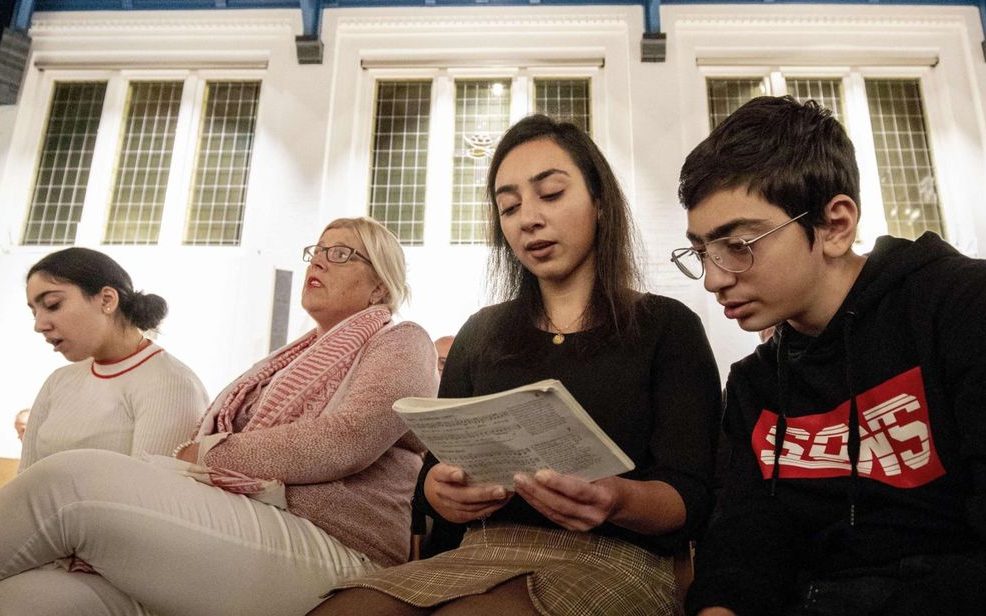Asylum seeker family saved by 96-day church service
Dutch government grants amnesty for Armenian refugees being sheltered under medieval law

A free daily email with the biggest news stories of the day – and the best features from TheWeek.com
You are now subscribed
Your newsletter sign-up was successful
A family of asylum seekers who faced deportation from the Netherlands has been given a reprieve after a church staged an epic 96-day service to shield them from immigration officials.
Sasun and Anousche Tamrazyan and their children Hayarpi, 21, Warduhi, 19, and Seyran, 15, have received assurances from Dutch officials that they will be among hundreds of families granted permanent residency under an amnesty agreed by the coalition government this week.
The Tamrazyans have lived in the Netherlands for nine years, after fleeing their native Armenia when Sasun received death threats because of his political activism.
The Week
Escape your echo chamber. Get the facts behind the news, plus analysis from multiple perspectives.

Sign up for The Week's Free Newsletters
From our morning news briefing to a weekly Good News Newsletter, get the best of The Week delivered directly to your inbox.
From our morning news briefing to a weekly Good News Newsletter, get the best of The Week delivered directly to your inbox.
In October they were notified that they were to be removed from their adopted country, after their application for political asylum was rejected following years of legal wrangling.
But a medieval-era Dutch law that bans authorities from entering a place of worship during a service allowed the family to claim refuge in the Bethel Protestant church in The Hague.
For 96 days, they have been living in the church while around 450 pastors from various denominations and lay volunteers preached for a total of 2,327 hours, CNN reports.
The reprieve, expected to affect 630 child refugees and their families, was agreed late on Tuesday night following “intense debate within the coalition government”, says The Guardian.
A free daily email with the biggest news stories of the day – and the best features from TheWeek.com
The families had applied for a “children’s pardon”, a special dispensation which can be granted in cases where children have lived in the Netherlands for more than five years, but which has been “patchily applied”, adds the newspaper.
The new amnesty, agreed by lawmakers from Prime Minister Mark Rutte’s centre-right party and coalition partners from progressive and right-wing parties, will see the children’s pardon taken off the statute books.
However, the head of the Immigration and Naturalisation Service will be given discretionary powers in future cases similar to that of the Tamrazyans.
Theo Hettema, chairman of the General Council of Protestant Ministers in the Netherlands, applauded the government’s decision.
“We are extremely grateful for a safe future for hundreds of refugee families in the Netherlands,” he said.
“For months we have held up hope, and now that hope is taking shape.”
-
 The ‘ravenous’ demand for Cornish minerals
The ‘ravenous’ demand for Cornish mineralsUnder the Radar Growing need for critical minerals to power tech has intensified ‘appetite’ for lithium, which could be a ‘huge boon’ for local economy
-
 Why are election experts taking Trump’s midterm threats seriously?
Why are election experts taking Trump’s midterm threats seriously?IN THE SPOTLIGHT As the president muses about polling place deployments and a centralized electoral system aimed at one-party control, lawmakers are taking this administration at its word
-
 ‘Restaurateurs have become millionaires’
‘Restaurateurs have become millionaires’Instant Opinion Opinion, comment and editorials of the day
-
 Epstein files topple law CEO, roil UK government
Epstein files topple law CEO, roil UK governmentSpeed Read Peter Mandelson, Britain’s former ambassador to the US, is caught up in the scandal
-
 Iran and US prepare to meet after skirmishes
Iran and US prepare to meet after skirmishesSpeed Read The incident comes amid heightened tensions in the Middle East
-
 Israel retrieves final hostage’s body from Gaza
Israel retrieves final hostage’s body from GazaSpeed Read The 24-year-old police officer was killed during the initial Hamas attack
-
 China’s Xi targets top general in growing purge
China’s Xi targets top general in growing purgeSpeed Read Zhang Youxia is being investigated over ‘grave violations’ of the law
-
 Panama and Canada are negotiating over a crucial copper mine
Panama and Canada are negotiating over a crucial copper mineIn the Spotlight Panama is set to make a final decision on the mine this summer
-
 Why Greenland’s natural resources are nearly impossible to mine
Why Greenland’s natural resources are nearly impossible to mineThe Explainer The country’s natural landscape makes the task extremely difficult
-
 Iran cuts internet as protests escalate
Iran cuts internet as protests escalateSpeed Reada Government buildings across the country have been set on fire
-
 US nabs ‘shadow’ tanker claimed by Russia
US nabs ‘shadow’ tanker claimed by RussiaSpeed Read The ship was one of two vessels seized by the US military